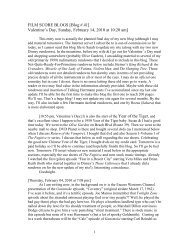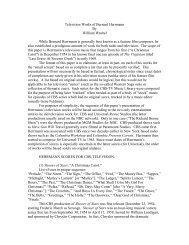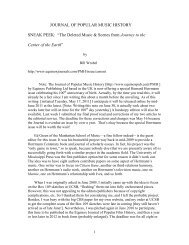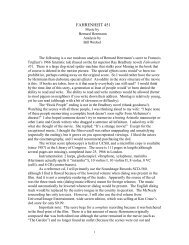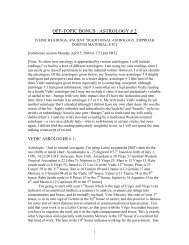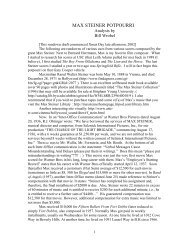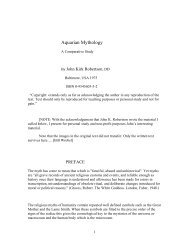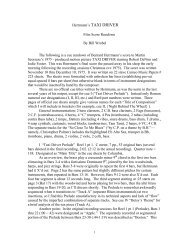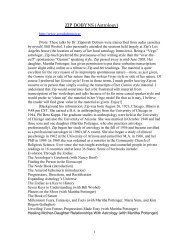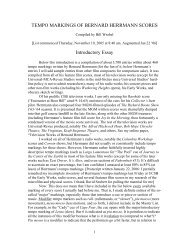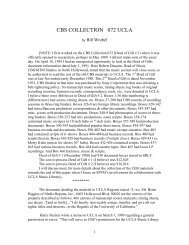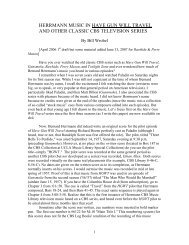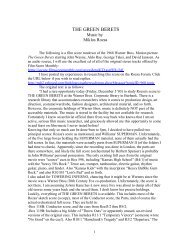- Page 1 and 2:
Bill Wrobel’s DVD Collection, Rev
- Page 3 and 4:
need to spend time on since I had a
- Page 5 and 6:
night. Karnes and the skipper and u
- Page 7 and 8:
There is a nice effect in Bar 18 (0
- Page 9 and 10:
play this an octave higher register
- Page 11 and 12:
have a sweet theme for a major fema
- Page 13 and 14:
Bb/Line 1 D staccato notes, while h
- Page 15 and 16:
Runs. -Reel 6/2 (#40465), Agitato i
- Page 17 and 18:
music by Thomas Newman, well, it’
- Page 19 and 20:
the full score was not in that box
- Page 21 and 22:
4) F tenuto half note to E to F ten
- Page 23 and 24:
By the way, the instrumentation for
- Page 25 and 26:
Check out this website for the movi
- Page 27 and 28:
especially in stressful and even mi
- Page 29 and 30:
to F up to Line 3 C 8ths down to (B
- Page 31 and 32:
music for the first time. The writt
- Page 33 and 34:
quarter note. After an 8 th rest in
- Page 35 and 36:
The next cue is “Tiger” (locate
- Page 37 and 38:
The opening of the Main Title by Jo
- Page 39 and 40:
http://www.amazon.com/Quatermass-Pi
- Page 41 and 42:
Reel 2 a) CHIMNEY SWEEP (Kennedy) P
- Page 43 and 44:
(followed by two quarter rests). Af
- Page 45 and 46:
-Northwest Frontier (1959) ** [musi
- Page 47 and 48:
at the end of Reel 1 is a.) Marsell
- Page 49 and 50:
I purchased this dvd from Warner Ar
- Page 51 and 52:
Steiner) starting at 00:10:51. Next
- Page 53 and 54:
I never did pull the written music,
- Page 55 and 56:
Nice, sharp print of the dvd, fine
- Page 57 and 58:
8. Trade Winds (Cliff Friend-Charli
- Page 59 and 60:
[Super Bowl Sunday, February 06, 20
- Page 61 and 62:
next four bars. After an 8 th rest
- Page 63 and 64:
half notes and 8 th notes (followed
- Page 65 and 66:
tied to 8 th notes (followed by an
- Page 67 and 68:
note held fermata. End of cue. The
- Page 69 and 70:
says, “My hero.” Dvd location i
- Page 71 and 72:
http://www.amazon.com/Dive-Bomber-E
- Page 73 and 74:
I am still watching the movie on my
- Page 75 and 76:
techniques in 1950 (the year I was
- Page 77 and 78:
As for the music, I really like the
- Page 79 and 80:
inforzando-marked ( > ) 8ths notes
- Page 81 and 82:
This is a curious movie, rather enj
- Page 83 and 84:
notes to (Bar 1) middle C rinforzan
- Page 85 and 86:
-Skipping to Reel 6/5. 18 pages, 70
- Page 87 and 88:
Korngold’s Prince & the Pauper fo
- Page 89 and 90:
[6] “Uncle” 2 pages. 4/4 time,
- Page 91 and 92:
Line 1 D [written E] half note to D
- Page 93 and 94:
inforzando whole note held fermata.
- Page 95 and 96:
cave] -Reel 5/1 Molto agitato in C
- Page 97 and 98:
except as a combined overall effect
- Page 99 and 100:
-Reel 1/3 [Old Man’s Hut] -Reel 2
- Page 101 and 102:
quarter rest in Bar 1, CB pluck p p
- Page 103 and 104:
thru 10 to (Bar 11) Bb notes to (Ba
- Page 105 and 106:
short wavy gliss line to Eb 8 th ti
- Page 107 and 108:
34. La Cucaracha - arr. Heindorf
- Page 109 and 110:
did not overly impress me beyond th
- Page 111 and 112:
I don’t know why the orchestrator
- Page 113 and 114:
The “Opening” cue (not sure now
- Page 115 and 116:
notes tied to whole notes in Bar 7.
- Page 117 and 118:
-Hollow Man (2000) ** 1/2 [music **
- Page 119 and 120:
“I’m A Genius” [R1/4] 20 bars
- Page 121 and 122:
(Bar 2) small octave Bb whole note
- Page 123 and 124:
“No Code” [Reel 5/2] 135 bars,
- Page 125 and 126:
the A min (A/C/E). Etc. After two q
- Page 127 and 128:
octave F half notes twice (repeated
- Page 129 and 130:
quarter notes to D-D 32 nd notes to
- Page 131 and 132:
V section (dvd 00:41:49). The Pas d
- Page 133 and 134:
-Darby’s Rangers (1957) *** [musi
- Page 135 and 136:
http://www.amazon.com/Dragnet-1967-
- Page 137 and 138:
-Green Berets (1968) ** [music ***]
- Page 139 and 140:
audience that hates a movie be nice
- Page 141 and 142:
Vietminh guerrillas in Indo-China,
- Page 143 and 144:
plays the pattern as well with the
- Page 145 and 146:
est). After an 8 th rest, Pos play
- Page 147 and 148:
ar. Clarinets play Line 1 E [writte
- Page 149 and 150:
“Camp Foch” (based on a French
- Page 151 and 152:
“Mahidi’s Death” Reel 14/A. D
- Page 153 and 154:
personally liked the section after
- Page 155 and 156:
there’s really not much “there
- Page 157 and 158:
The alto flute (on mike) plays p es
- Page 159 and 160:
2) Bb down to E down to Line 2 Bb u
- Page 161 and 162:
notes. The harp plays Contra-octave
- Page 163 and 164:
unless the director and others invo
- Page 165 and 166:
-Advise & Consent (1962) ** � [mu
- Page 167 and 168:
-Laura Croft: Tomb Raider (2001) **
- Page 169 and 170:
Another very good Jack Webb product
- Page 171 and 172:
format. Couple it with one of the b
- Page 173 and 174:
Communication (memo) from R. J. Obr
- Page 175 and 176:
(Bar 3) F# whole note tied to next
- Page 177 and 178:
whole note tied to quarter note nex
- Page 179 and 180:
9 Scott “ “ “ 00:25 10 Funera
- Page 181 and 182:
There are several graphic scenes th
- Page 183 and 184:
“messing” with the audience, cr
- Page 185 and 186:
This is a delightful, energetic, ap
- Page 187 and 188:
Hollander’s cue “Heaven” from
- Page 189 and 190:
Bar 14 strings I believe play a ser
- Page 191 and 192:
sheep, and then more horses were sc
- Page 193 and 194:
although it is no classic. There’
- Page 195 and 196:
Kubrick and ultimately Spielberg wa
- Page 197 and 198:
Pope. “David Studies Monica” [1
- Page 199 and 200:
Violins I in 4/4 time sound p Line
- Page 201 and 202:
-A Talk With Hitchcock (1964) *** h
- Page 203 and 204:
interesting with the operation scen
- Page 205 and 206:
[The Fight] Reel 5/1, Agitato in C
- Page 207 and 208: [Revelation/Herd] I believe part of
- Page 209 and 210: Good DePalma movie (but not great)
- Page 211 and 212: Incidentally, you can see Young bei
- Page 213 and 214: http://www.amazon.com/Sling-Blade-D
- Page 215 and 216: http://www.amazon.com/Return-Vampir
- Page 217 and 218: After a half rest in Bar 3, violas
- Page 219 and 220: “flaw” for some people is the
- Page 221 and 222: I actually studied the full score a
- Page 223 and 224: [Brookfield School Song] :43 durati
- Page 225 and 226: [Vienna Inn Scene] Cue # 7058 (also
- Page 227 and 228: B up to Line 1 D to F# legato quart
- Page 229 and 230: interesting scenes. Hawks took off
- Page 231 and 232: http://www.amazon.com/Seventh-Seal-
- Page 233 and 234: “Main Title” Reel 1/1, 10 pages
- Page 235 and 236: down to Line 1 Bb 16ths. Violas plu
- Page 237 and 238: two bars to (Bar 10) D whole note (
- Page 239 and 240: In Bar 16 (dvd 00:05:15) we come to
- Page 241 and 242: E-F-F#-A legato 16ths (silent next
- Page 243 and 244: to-be ex-partner, get the money to
- Page 245 and 246: (followed by an 8 th rest) to F/mid
- Page 247 and 248: to sniff out Sue who has stopped ne
- Page 249 and 250: gliss line down to small octave E t
- Page 251 and 252: (followed by two 8 th rests) to the
- Page 253 and 254: “Can Can Part 3” Cue # 35129. K
- Page 255 and 256: Skipping slightly to Bar 195 (dvd 1
- Page 257: notes and then Bb-G half notes to (
- Page 261 and 262: This is a decent sci-fi movie but a
- Page 263 and 264: Included in this set are the first
- Page 265 and 266: http://www.filmscorerundowns.net/he
- Page 267 and 268: For about $140 million you will exp
- Page 269 and 270: small octave D/G to same D/G to D/G
- Page 271 and 272: notes (followed by a quarter and ha
- Page 273 and 274: Neal meet. The dialog in that scene
- Page 275 and 276: Of special merit in this dvd Specia
- Page 277 and 278: (followed by a quarter rest) to (ne
- Page 279 and 280: -# 2B “Bye Bye Charlie” in �
- Page 281 and 282: sleazy role, and Greenstreet contin
- Page 283 and 284: 9followed by an 8 th rest) to same
- Page 285 and 286: one next. ….So far, after watchin
- Page 287 and 288: and David Hedison. The scifi disast
- Page 289 and 290: -The Wrong Man (1956) *** [music **
- Page 291 and 292: ask? Too bad Columbo wasn’t aroun
- Page 293 and 294: -Spaceballs (1987) *** 7/8 [music *
- Page 295 and 296: -“Driving Home” Reel �. Andan
- Page 297 and 298: -Reel 6/1 Revised “When Johnny Co
- Page 299 and 300: http://books.google.com/books?id=sr
- Page 301 and 302: appetizer, no desert). If you’ve
- Page 303 and 304: I can’t say I like this bleak Ing
- Page 305 and 306: plays p ascending legato 16ths Grea
- Page 307 and 308: Bar 19 to play Line 1 G#-A#-B-Line
- Page 309 and 310:
The movie never appealed to me but
- Page 311 and 312:
the busy-body lady tells people tha
- Page 313 and 314:
numbers in Calamity Jane, however!
- Page 315 and 316:
I reviewed this dvd on Talking Herr
- Page 317 and 318:
yarn) starring the excellent Johnny
- Page 319 and 320:
ehearsal of the fight that somehow
- Page 321 and 322:
classic!). I loved the actors such
- Page 323 and 324:
Back to Poledouris, I would recomme
- Page 325 and 326:
“rolling stream ostinati” that
- Page 327 and 328:
I discussed my September and Octobe
- Page 329 and 330:
The gong is struck in Bar 5.The cym
- Page 331 and 332:
Bb/F quarter notes to C/Eb quarter
- Page 333 and 334:
[cont.] Vacation Trip] Reel 7/1, 6
- Page 335 and 336:
Reel 12 material starts with “Sem
- Page 337 and 338:
http://www.lovingtheclassics.com/Je
- Page 339 and 340:
-Snows of Kilimanjaro (1952) ** 1/2
- Page 341 and 342:
eturning in Bar 4 on middle Cb [wri
- Page 343 and 344:
3 & 5. Violins I play Line 3 F# who
- Page 345 and 346:
note tied to next two bars. Bottom
- Page 347 and 348:
Eb dotted half note tied to quarter
- Page 349 and 350:
Line 2 Bb dotted half note to A qua
- Page 351 and 352:
he got loose. Of course if the writ
- Page 353 and 354:
from her store! Ironically, conside
- Page 355 and 356:
Shakespeare, however, and most of t
- Page 357 and 358:
note to (Bar 3) F# [written G#] who
- Page 359 and 360:
00:59:52) is quite nice, especially
- Page 361 and 362:
cinematography and Lean’s expert
- Page 363 and 364:
http://www.amazon.com/Naked-City-Yo
- Page 365 and 366:
note tied to “3” triplet value
- Page 367 and 368:
In Bar 1 the timp is rolled on C wh
- Page 369 and 370:
This is not a good conspiracy movie
- Page 371 and 372:
-“The Doomsday Machine” -‘Met
- Page 373 and 374:
Season Three, “Love’s Old Sweet
- Page 375 and 376:
as the bus rising along the desert
- Page 377 and 378:
There are five discs here starting
- Page 379 and 380:
-The Naked Jungle (1954) *** [music
- Page 381 and 382:
his best works. Let’s put it this
- Page 383 and 384:
http://www.amazon.com/Drums-Deep-So
- Page 385 and 386:
I did like the bluish star field lo
- Page 387 and 388:
effect of I believe the stopped hor
- Page 389 and 390:
Richard Boone as the good doctor pr
- Page 391 and 392:
http://www.amazon.com/Adventures-Bu
- Page 393 and 394:
Page Cook (his real name was Charle
- Page 395 and 396:
Shortly in Bar 6 the piccolo plays
- Page 397 and 398:
phrasing of Line 1 F legato down to
- Page 399 and 400:
http://www.amazon.com/French-Connec
- Page 401 and 402:
-The Raid (1954) *** � [music ***




